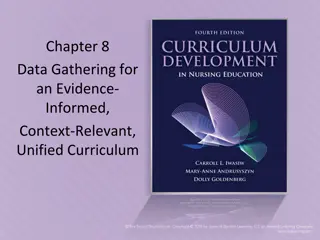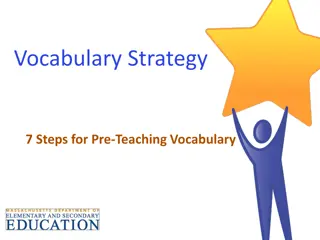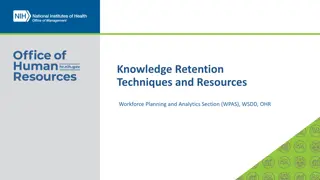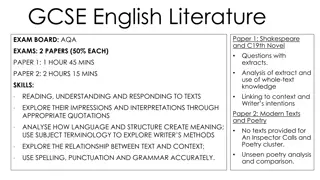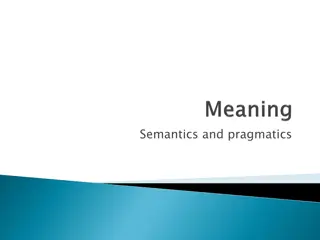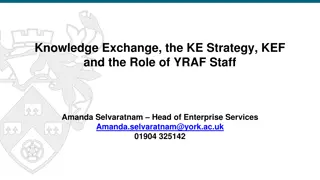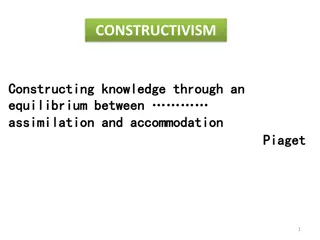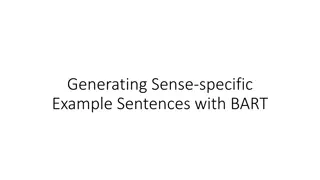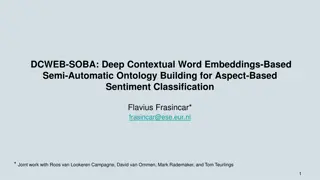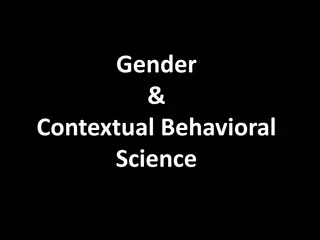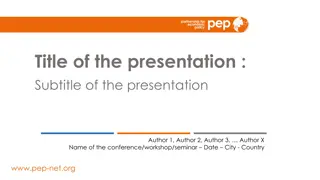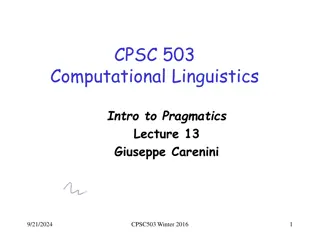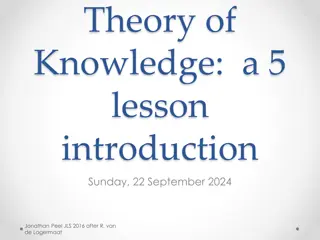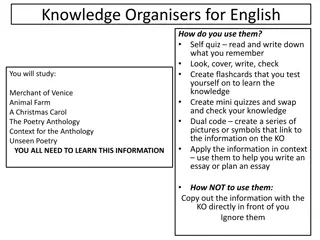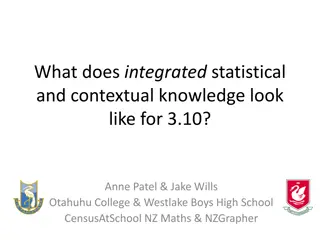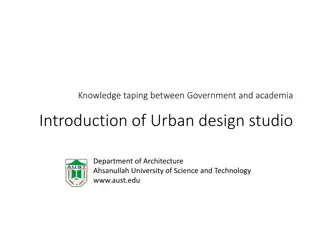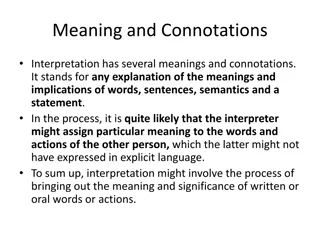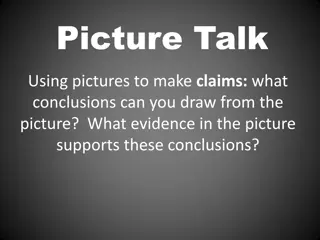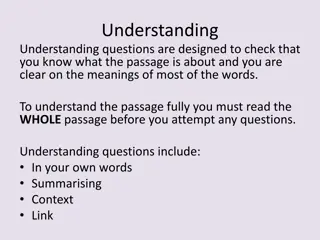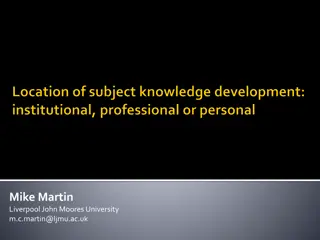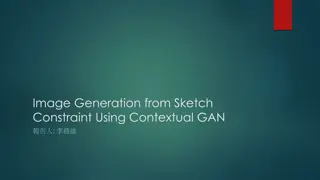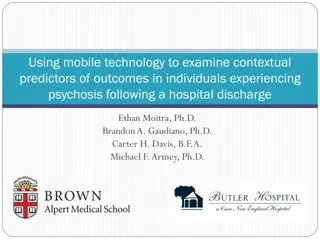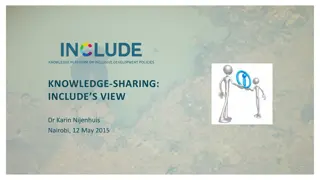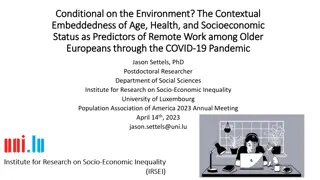Knowledge Capture
Knowledge capture is crucial for organizations to retain valuable expertise and prevent loss of critical knowledge due to employee turnover. Tacit and explicit knowledge play key roles, requiring strategic planning for retention, incentivizing knowledge-sharing culture, and implementing effective st
0 views • 6 slides
Understanding Knowledge Management: Processes and Frameworks 2. In knowledge management, organizations create, share, and manage knowledge to enhance performance. It involves acquiring different types of knowledge through various means, such as perc
Knowledge Management, Organizational Objectives, Types of Knowledge, Tacit Knowledge, Explicit Knowledge
1 views • 17 slides
Understanding Contextual Factors in Curriculum Development
This chapter delves into the significance of internal and external contextual factors in shaping curriculum development. It discusses the process of gathering essential contextual data, identifying relevant sources, and integrating data to create an evidence-informed, context-relevant, unified curri
5 views • 31 slides
Effective Pre-Teaching Vocabulary Strategies for ELs
ELs benefit from specific pre-teaching vocabulary strategies such as selecting important words, providing contextual understanding, offering student-friendly definitions, and engaging in oral interactions. Massachusetts Department of Elementary and Secondary Education emphasizes the importance of ch
2 views • 7 slides
Understanding Contextual Safeguarding in Multi-Agency Working
This workshop aims to assist multi-agency practitioners in developing Contextual Safeguarding approaches through team activities and discussions. The session covers partnership working outside the home, the ecological approach of Contextual Safeguarding, and an exercise on creating safety in various
0 views • 26 slides
Understanding Discourse Analysis: Formal Links and Contextual Connections
Discourse analysis involves examining language beyond grammar rules, focusing on formal links within sentences and contextual connections outside of language. Guy Cook discusses how formal features shape discourse meaning and how verb forms influence sentence coherence. The use of parallelism in spe
3 views • 22 slides
Effective Knowledge Retention Strategies in Workforce Planning and Analytics
Retaining knowledge is crucial for organizations to enhance customer service, foster innovation, improve efficiency, and bridge skill gaps. This article explores the significance of knowledge retention, the types of knowledge essential for succession planning, and two effective strategies - the Know
1 views • 10 slides
Exam Preparation Guide for GCSE English Literature and Language
Prepare effectively for your GCSE English Literature and Language exams by understanding the requirements of each paper, practicing with provided extracts and models, creating your own questions and responses, and analyzing texts with contextual knowledge. Enhance your skills in analyzing language,
0 views • 11 slides
Understanding Political Theory through a Contextual Approach
Exploring G.H. Sabine's perspective on political theory through a contextual approach, emphasizing the importance of historical context and societal influences. Sabine argues that while political theory evolves with its contemporary politics, it should be analyzed within its specific time and social
0 views • 9 slides
Understanding Semantics and Pragmatics in Language Study
Semantics and pragmatics are key areas of language study that focus on the meanings of words, phrases, and sentences. Semantics delves into the literal meanings and language as a system, while pragmatics explores how speakers use language in context. Understanding semantic meaning involves consideri
3 views • 77 slides
Insights from WJEC A Level English Literature Examiners' Report
Examiners noted candidates' strengths and weaknesses in analyzing poetry pre-1900 and unseen poetry. Candidates lacked confidence in discussing form and contextual influences, but some effectively integrated these aspects. Responses to individual poems were detailed, with contextual focus crucial in
3 views • 18 slides
GCSE English Literature Exam Overview
This overview provides information on the GCSE English Literature exam structure, content, and assessment objectives for both components. It includes details on the texts studied, such as Shakespeare, poetry, post-1914 prose/drama, and 19th-century prose. Students are assessed on their ability to re
0 views • 23 slides
Enhancing Knowledge Exchange Strategies for University Growth
Knowledge Exchange Framework (KEF) and strategies are essential for universities to improve performance, engage with stakeholders, and enhance public visibility. This involves developing diverse offerings, creating a supportive ecosystem, managing external relationships effectively, and embedding a
0 views • 10 slides
Effective Strategies for AS English Literature Examinations
Targeting AO1 and AO2 in AS English Literature exams requires focused analysis of extracts and proper engagement with the task. Avoid irrelevant details, stay concise, and make every word count. For longer essay responses, plan carefully, engage directly with the question, and provide brief, relevan
0 views • 6 slides
Exploring Contextual Ideas in Frankenstein by Mary Shelley
An analysis of contextual ideas related to the study of Frankenstein by Mary Shelley. Delve into the key connotations, connections with other literary texts, and the enduring resonance of a novel written almost 200 years ago. Understand the significance of the contexts in which literary texts are wr
0 views • 57 slides
Understanding Constructivism in Learning
Constructivism is a philosophy of learning that emphasizes the active process of constructing knowledge through a balance of assimilation and accommodation. Learners create their own understanding by reflecting on experiences, engaging in active learning, using language, social interaction, and cont
2 views • 16 slides
Exploring the Similarities Between Goldiamond's Work and CBS Approaches
Israel Goldiamond's work in professional development, ethics, and behavior analysis shows similarities with CBS approaches, emphasizing contextual factors, functional analyses, and long-term goals. Both approaches focus on understanding behavior within its context and promoting positive change throu
3 views • 5 slides
Motivating Patients on Smoking Cessation: A Contextual Approach Overview
Explore behavioral interventions for smoking cessation, gain insights into effective brief interventions, and learn to apply them using real-world examples. Understand the challenges in tobacco management in primary care and discover common strategies to support patients in quitting smoking. Embrace
0 views • 19 slides
Generating Sense-specific Example Sentences with BART Approach
This work focuses on generating sense-specific example sentences using BART (Bidirectional and AutoRegressive Transformers) by conditioning on the target word and its contextual representation from another sentence with the desired sense. The approach involves two components: a contextual word encod
0 views • 19 slides
Semi-Automatic Ontology Building for Aspect-Based Sentiment Classification
Growing importance of online reviews highlights the need for automation in sentiment mining. Aspect-Based Sentiment Analysis (ABSA) focuses on detecting sentiments expressed in product reviews, with a specific emphasis on sentence-level analysis. The proposed approach, Deep Contextual Word Embedding
0 views • 34 slides
Understanding Gender and Behavioral Science
Exploring the nuances of gender, this content delves into the variance among genders, the impact of gender on behavior, and societal issues related to gender discrimination. It challenges the binary view of gender and highlights the performative spectrum influenced by culture, language, biology, and
0 views • 18 slides
Exploring Epistemology: Understanding Knowledge and Truth
Epistemology delves into the nature of knowledge, understanding, wisdom, and justification, questioning the extent of human knowledge and the different kinds of knowledge. It explores skepticism and conditions on propositional knowledge, discussing whether knowledge implies truth and the debate betw
1 views • 54 slides
Policy Implications of Research on Contextual Factors Affecting Urban Development
Explore the impact of contextual factors on urban development, presenting research findings, policy implications, and recommendations. The presentation covers motivations, research questions, methodology, data analysis, and key findings to aid policymakers in enhancing urban planning strategies.
0 views • 12 slides
Navigating the World of Big Data, Knowledge, and Crowdsourcing
The world has evolved into a data-centric landscape where managing massive amounts of data requires the convergence of big data, big knowledge, and big crowd technologies. This transformation necessitates the utilization of domain knowledge, building knowledge bases, and integrating human input thro
1 views • 5 slides
Understanding Computational Linguistics: Pragmatics and Formalisms
Explore the world of computational linguistics through topics like pragmatics, formalisms, knowledge representation, state machines, neural models, semantics, and discourse analysis. Dive into the intricacies of language structures, meanings, and contextual inferences to unravel the complexities of
0 views • 64 slides
Exploring the Nature of Knowledge in Theory of Knowledge
Delve into the essence of knowledge with Jonathan Peel's introduction to Theory of Knowledge, pondering on how different disciplines perceive knowledge, the impact of empirical questioning, and timeless wisdom on ignorance and progress. Explore the concept of basic knowledge and its implications, in
0 views • 37 slides
Study Guide for "Merchant of Venice" - Key Contextual Information and Analysis Points
Explore the key moments and contextual information of "Merchant of Venice" to enhance your understanding of the play. Delve into themes such as patriarchy, money lending, anti-Semitism, and more. Learn about the significant characters and events, along with analysis points to enrich your interpretat
0 views • 12 slides
Understanding Contexts: A Meta-Ontological Approach
Ontologies provide a general representation of reality, but knowledge is mostly context-dependent. Analyzing different types of contexts, from linguistic to manufacturing, remains a challenge. This study aims to deepen the understanding of the ontological nature of contexts by leveraging a meta-onto
0 views • 14 slides
Enhancing Statistical Inference in Educational Investigations
This content delves into the importance of integrated statistical and contextual knowledge for achieving success in Level 3 NCEA statistics involving the statistical enquiry cycle. It emphasizes the essential steps of posing investigative questions, utilizing appropriate statistical methods, discuss
0 views • 26 slides
Understanding Modelling Knowledge and Knowledge Representation
Explore the significance of modelling knowledge through knowledge representation, making it explicit, independent, and reusable. Learn why knowledge representation is essential and how it facilitates exchange, query, inference, and visualization. Delve into examples of knowledge application in vario
0 views • 30 slides
Knowledge Collaboration: Urban Design Studio at Ahsanullah University of Science and Technology
In the Fall 2014 Semester, the Department of Architecture at Ahsanullah University of Science and Technology participated in the MSDP project, collaborating with the UDD. The studio worked on various urban design projects in Mymensingh, focusing on transportation hubs, riverfront development, histor
0 views • 14 slides
Unveiling the Art of Interpretation: From Textual Meanings to Contextual Significance
Interpretation delves into the meanings and implications of words, sentences, and classical texts, bringing out their significance. It involves decoding complex ideas, separating temporal and perennial thoughts, and revealing contemporary relevance. Different approaches like textual and contextual a
0 views • 18 slides
Analyzing Conclusions Through Picture Interpretation
Utilizing visual cues and background knowledge, this exercise involves making claims based on images and supporting those claims with evidence. The sample pictures provided focus on a celebratory scene related to a Super Bowl victory and emphasize the importance of drawing conclusions from visual co
0 views • 9 slides
Techniques for Passage Comprehension
Techniques such as understanding, summarizing, and contextual analysis are essential for effective passage comprehension. In your own words, summarizing key points, and deciphering contextual questions play a vital role in grasping the content fully. By utilizing these methods, you can enhance your
0 views • 46 slides
Understanding Subject Knowledge Development in Education
Exploring the complexities of subject knowledge development in education, this study delves into areas such as students' existing knowledge, competencies, and the role of institutions in shaping knowledge acquisition. The focus lies on personalizing knowledge to individual needs rather than a fixed
1 views • 22 slides
Contextual GAN for Image Generation from Sketch Constraint
Utilizing contextual GAN, this project aims to automatically generate photographic images from hand-sketched objects. It addresses the challenge of aligning output with free-hand sketches while offering advantages like a unified network for sketch-image understanding. The process involves posing ima
0 views • 21 slides
Contextual Predictors of Psychosis Outcomes Post-Hospital Discharge
This study explores predictors of outcomes in individuals with psychosis post-hospital discharge using mobile technology. It addresses treatment nonadherence, the impact of antipsychotics, psychological flexibility, and the use of ecological momentary assessment (EMA). The research highlights the cr
0 views • 27 slides
Knowledge Sharing and Inclusive Development Policies
Knowledge Platform on Inclusive Development Policies (INCLUDE) focuses on enhancing research utilization in policy-making to foster more inclusive development. It was established in 2012 with the aim of bridging the gap between research and policy processes in African countries. INCLUDE engages expe
0 views • 8 slides
Conditional on the Environment? The Contextual Embeddedness of Age, Health, and Socioeconomic Status as Predictors of Remote Work among Older Europeans through the COVID-19 Pandemic
This study delves into how the COVID-19 pandemic has influenced remote work patterns among older Europeans, focusing on the interaction between age, health, socioeconomic status, and contextual factors. It explores the impact of government restrictions, education, income, age, and health on the abil
0 views • 24 slides
Importance of Contextual Lead-Ins in Incorporating Quotes
When incorporating quotes in your SAR or body paragraph, it's crucial to provide a contextual lead-in. This means introducing the quote with a summary derived from the text itself. Examples from Bradbury's work illustrate how contextual lead-ins enhance the understanding and relevance of quoted pass
0 views • 6 slides


